
French postcard by J.R.P.R., Paris, no. 351. Photo: Studio Lorelle, Paris. Renée Héribel in Minuit... Place Pigalle (René Hervil, 1928).
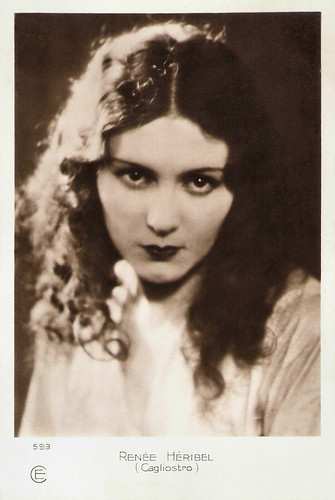
French postcard by Cinémagazine-Edition, no. 593. Renée Heribel as Lorenza in the Franco-German co-production Cagliostro (Richard Oswald, 1929).
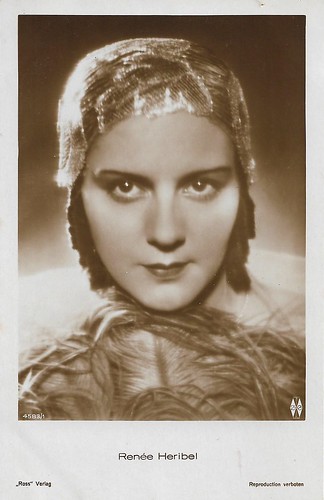
German postcard by Ross Verlag, no. 4583/1, 1929-1930. Renée Héribel in Narkose (Alfred Abel, 1929).

French postcard by Cinémagazine-Édition, Paris, no. 701. Photo: Renée Héribel in Les Trois masques/The Three Masks (André Hugon, 1930).
A leap abroad to Germany
Renée Eugénie Aimée Héribel was born in Caen, France, in 1903.
At 21, she made her film debut in the serial Le vert gallant/The Gallant Green (René Leprince, 1924), about the amorous adventures of King Henri IV.
Héribel's first big box office hit followed with Madame Sans-Gêne (Léonce Perret, 1925) with Gloria Swanson in the lead role.
This was followed by other French productions e.g. the serial Fanfan-la-Tulipe (René Leprince, 1925) with Aimé Simon-Girard, the village drama L'île enchantée/Corsican Love (Henry Roussel, 1925) with Jean Garat, and Minuit, Place Pigalle/Midnight ... Place Pigalle (René Leprince, 1927).
Finally, Héribel made the leap abroad and acted in Germany in Die weisse Sklavin/The White Slave (Augusto Genina, 1927) with Liane Haid and Vladimir Gajdarov.
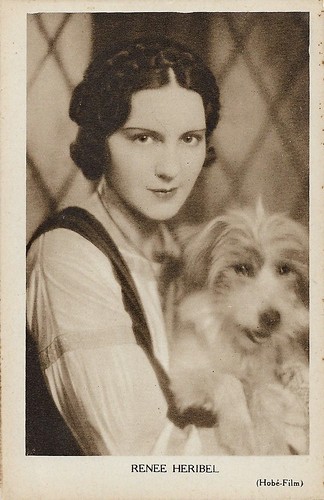
Belgian [?] collector card. Photo: Hobé-Film. Renée Héribel and [her] dog.

French postcard. Publicity card for the French late silent film Minuit... Place Pigalle/Midnight ... Place Pigalle René Hervil, 1928), starring Nicolas Rimsky and Héribel, and produced by Films Français Aubert.

Austrian postcard by Iris-Verlag, no. 5798. Photo: Allianz-Film / Abel Produktion der GP. Renée Heribel in Narkose/Narcose (Alfred Abel, 1929).
The first French sound film
In Germany, Renée Héribel also starred in Die Stadt der tausend Freuden/The City of a Thousand Delights (Carmine Gallone, 1927) with Paul Richter and Adele Sandrock, and the Danish-German coproduction Jokeren/ Der Faschingskönig/The Joker (Georg Jacoby, 1928) starring Henry Edwards in the title role.
1929 was an important year in her career. She played Lorenza, wife of the eighteenth-century Italian occultist Alessandro Cagliostro (Hans Stüwe) in Cagliostro (Richard Oswald, 1929). Isabelle Michel at CineArtistes: "A key role in the career of the actress who reveals the extent of her talent through her acting, full of sensitivity and emotion as a woman who is loving and worried about her husband."
In Germany, she also starred opposite Alfred Abel in Narkose/Anesthesia (Alfred Abel, Ernst Garden, 1929), an adaptation of Stefan Zweig’s novel 'Letter from an Unknown Woman'.
Héribel appeared in the first French sound film Les Trois masques/The Three Masks (André Hugon, 1930), in which two Corsican brothers decide to take revenge against the young man who has got their sister pregnant, unaware that he is trying to marry her in the face of his father's opposition. As no French studio had yet been converted for sound, it was shot at Twickenham Studios in London.
In the following years, she acted in a few more sound films, including Chacun sa chance/Everyone their chance (Hans Steinhoff, René Pujol, 1931) opposite Jean Gabin, Les Nuits de Port Saïd/The Nights of Port Said (Léo Mittler, 1932), and her final film, Le Crime du chemin rouge/The crime of the red road (Jacques Séverac, 1933).
The reason for her retirement at age 30 is unknown. In 1952 Renée Héribel died in Neuilly-sur-Seine at the age of only 49 years. She is buried at the Auteuil cemetery in Paris.
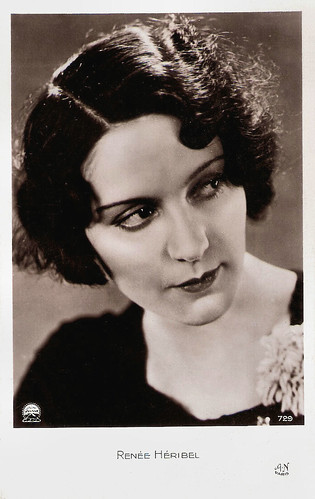
French postcard by A.N., Paris, no. 729. Photo: Films Paramount.
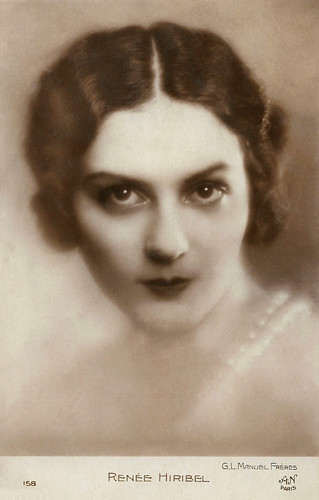
French postcard in the Les Vedettes de Cinéma, series by A.N., Paris, no. 158. Photo: G.L. Manuel Frères. Héribel's name is misspelled on this postcard as Hiribel.

French postcard by Cinémagazine-Selection, no. 767.
Sources: Isabelle Michel (CineArtistes - French), Thomas Staedeli (Cyranos), Wikipedia (French and English), and IMDb.
This post was last updated on 8 September 2024.
No comments:
Post a Comment